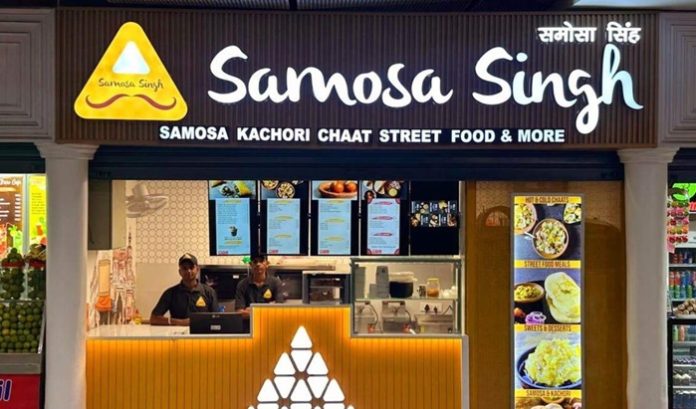Samosa Singh, a quick-service restaurant (QSR) chain, started 2025 by launching two new outlets in Hyderabad. The decision to expand in this city was driven by Hyderabad’s love for flavorful snacks and the growing QSR culture. “These sites were selected with great care for their heavy foot traffic and convenient locations, making snacking hassle-free for our customers. With Hyderabad’s changing food habits and the success of the QSR segment in the city, this expansion was a natural step,” says Nidhi Singh, co-founder, Samosa Singh.
According to Singh, Hyderabad’s love for samosas, combined with Samosa Singh’s offerings, has resulted in high demand. Customers appreciate the brand’s crispy, less oily samosas and the consistent quality they maintain. Strong sales and repeat visits in the first few weeks reaffirmed that the expansion was a well-calculated move.

She pointed out QSR market is growing rapidly and believes differentiation to be the key to sustaining this market. “With a varied menu options and upcoming fusion food plans in our menu we are offering new varieties of Samosas and we are constantly perfecting our recipes to make samosas that not only taste great but are also healthier than conventional options,” Singh explains.
According to Singh, the QSR industry in India has evolved beyond burgers and pizzas, with homegrown brands gaining popularity. Indian street food is seeing a revival, with regional specialties making their way into organized formats. “Even beyond metros and Tier I cities, Indian cuisine QSRs have bright prospects. Customization based on demographics is crucial for acceptability in smaller cities.” Singh explains.
The new manufacturing unit in Bengaluru
Samosa Singh has set up a new manufacturing facility in Bengaluru to enhance quality, scalability, and efficiency. “Our manufacturing capability has always been the backbone of our business. With key certifications and the highest standards of hygiene, we are on a quest to become one of the largest samosa manufacturers in the country,” says Singh.
Their emphasis with the new manufacturing unit is on technology-driven manufacturing, which provides precision in taste, hygiene, and consistency ensuring that every samosa maintains its authentic flavor; and scalability, for rapid expansion, providing not only to domestic demand but also to international markets. At the new unit, the team has come up with advanced machinery that allows automation and mass production without compromising on quality.
Expansion and Future Innovation
Scaling up while maintaining authenticity is one of the biggest challenges for any food brand. “The idea for Samosa Singh came from a simple realization—leisure time and snacks are deeply woven into India’s cultural fabric. Despite samosas being so loved globally, there was no organized brand catering to this market. That’s why we took the entrepreneurial plunge,” says Singh.
By using a strong manufacturing backbone and tech-enabled operations, Samosa Singh ensures that its samosas retain their signature crispiness and fresh taste, even as production scales up.
With plans to launch new stores across major Indian cities, the brand is looking to expand internationally as well, and boost exports. “This is just the beginning of our endeavor to globalize India’s favorite snack,” Singh affirms.
With Samosa Singh 2.0 on the cards for the future, the brand promises a refreshed menu with new flavors while maintaining the warmth and crispiness that customers love. Singh hints at a major launch coming soon.
IndiFoodBev — authentic, impactful and influential
An English-language food and beverage processing and packaging industry B2B platform in print and web, IndiFoodBev is in its third year of publication. It is said that the Indian food and beverage industries represent approximately US$ 900 billion in revenues which implies more than 20% of the country’s GDP. Eliminating the wastage on the farmside can help to deliver more protein to a higher number of the population apart from generating sizable exports. The savings in soil, seeds, water, fertilizer, energy and ultimately food and nutrition could be the most immense contribution that country is poised to make to the moderation of climate change.
To improve your marketing and grow sales to the food and beverage processing and packaging industry, talk to us. Our research and consulting company IppStar [www.ippstar.org] can assess your potential and addressable markets in light of the competition. We can discuss marketing, communication, and sales strategies for market entry and growth.
Suppliers and service providers with a strategy and budget for targeted marketing can discuss using our hybrid print, web, video, and social media channels to create brand recognition linked to market relevance. Our technical writers are ready to meet you and your customers for content.
The second largest producer of fruit and vegetables in the world is continuously expanding processing capacities and delivery systems with appropriate innovative technologies. We cover product and consumer trends, nutrition, processing, research, equipment and packaging from farm to thali. Get our 2025 media kit and recalibrate your role in this dynamic market. Enhance your visibility and relevance to existing markets and turn potential customers into conversations. Ask for a sample copy of our bi-monthly in print or our weekly IndiFoodBev eZine each Wednesday.
For editorial info@ippgroup.in — for advertisement ads1@ippgroup.in and for subscriptions subscription@ippgroup.in
Naresh Khanna – 10 February 2025
Subscribe Now











